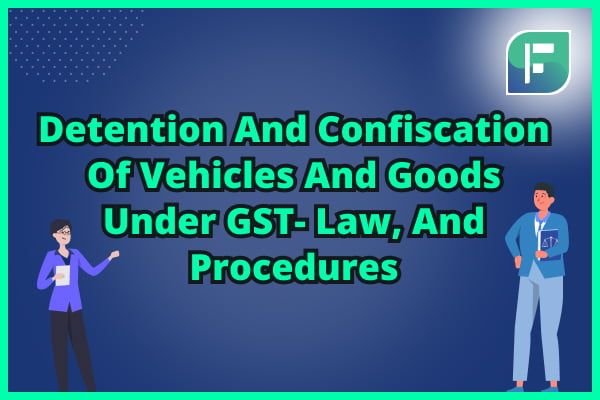An electronic waybill must accompany any goods transportation (also known as a “movement of goods”) by a registered individual that exceeds Rs 50,000. The proper officer is authorized to intercept goods in transit by the Centre or the State. The individual responsible for a vehicle conveying products surpassing Rs. 50,000 is expected to convey the recommended reports (for example receipt and an e-way bill). The appropriate officer can inspect the documents and goods during an interception.
Differentiating Between Seizure, Confiscation, and Detention
Detention
Not permitting admittance to the proprietor of the merchandise by a lawful request/notice is called confinement. However, the owner retains ownership of the goods. It is issued when there is a suspicion that the goods could be taken away.
Seizure
The department actually takes possession of the goods when it seizes them. Seizure can be made solely after request/examination that the products are responsible for seizure.
Confiscation
Following an appropriate adjudication, the final action is the confiscation of the goods. The original owner loses both ownership and possession once the property is taken from them and given to the government authority.
Penalty for Seized Goods
The goods, any supporting paperwork, and the vehicle in which they are being transported will be confiscated if anyone transports them in violation of the GST Act. The merchandise will be delivered exclusively on installment of duty and punishment.
If the owner of the goods comes forward, a penalty of one hundred percent (equal to the amount of tax) will be assessed. If the owner does not, a penalty of fifty percent of the value of the goods before tax will be assessed. [For exempted goods, 2% (if owner comes forward) or 5% of value of goods (if owner does not forward) OR Rs.] 25,000, or the lesser amount]
Thus, it stands that the punishment is a lot higher in the event that the proprietor of the merchandise doesn’t approach. The individual may also choose to provide security for the amount due.
Procedure for Seizure of Goods In Transit
Only after issuing an order of detention to the individual who is transporting the goods will the goods and the conveyance be detained or seized. On confining, the expense official will give a notification referencing the duty payable and pass a request for installment of duty and punishment.
A chance to be heard will be provided. All detention obligations will be discharged upon payment of the tax and penalty. The goods will be taken away from the owner if they are not paid within seven days. In the case of perishable or hazardous goods, the seven-day period will be reduced.
Confiscation Under GST
If a person:
- Supplies or receives goods in violation of the provisions of GST to evade tax
- Cannot account for the presence of seized goods Supplies goods without registering (even though he is liable to register)
- Violates rules to evade tax
- Uses any conveyance or vehicle to transport goods in violation of the provisions of GST, the goods and the vehicle may not be confiscated if the owner of the vehicle can demonstrate that it was used without his knowledge.
Punishment will likewise be pertinent in every one of the above cases. Please read our article to learn more about GST penalties. The tax officer must offer the option to pay a fine rather than take the goods before doing so.
Fine in Lieu of Confiscation
If the owner does not come forward, the minimum penalty will be 50% of the value of the goods before tax and 100% of the tax if the owner does. Most extreme fine will be the market worth of products before charge. The owner of the vehicle will be given the option to pay a fine equivalent to the goods’ tax if it is taken away.
Fine in lieu of seizure doesn’t release different punishments relevant. Different duties, charges, punishments will in any case be payable subsequent to paying fine in lieu of seizure.
Without a notice of cause and an opportunity to be heard, goods will not be taken away. The goods will become the government’s once they are taken away. 90 days will be given for installment of the seizure fine after which the merchandise will be sold. Seizure won’t influence different disciplines under the arrangements of GST, i.e., all punishments and indictments will in any case be material.
End Note
With this article, there was a thorough detailed analysis regarding Detention And Confiscation Of Vehicles And Goods Under GST- Law, importance, and different procedures related to that.





